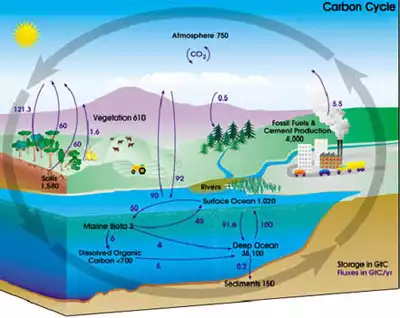Climate and The Carbon Cycle: Unit Overview
NOTE TO USERS: This module is still under development. Content has not yet been finalized for classroom use.
Why study the carbon cycle?

Carbon is constantly in the news. Have you heard of carbon dioxide and the greenhouse effect? The carbon cycle plays a key role in regulating Earth's global temperature and climate by controlling the amount of carbon dioxide in the atmosphere. The greenhouse effect itself is a naturally occurring phenomenon that makes Earth warm enough for life to exist. Without the greenhouse effect, Earth would be a much colder place. Carbon dioxide is an important greenhouse gas, because it helps Earth's atmosphere to retain heat generated from the Sun. But sometimes, too much of a good thing can have negative consequences. Too much carbon dioxide going into the atmosphere can lead to a planet that gets unnaturally hot.
Since the industrial revolution in the 19th century, carbon dioxide in the atmosphere has risen by 30%. Scientists have shown that this increase in carbon dioxide is a result of human activities that have occurred over the last 150 years, including the burning of fossil fuels and deforestation. Since carbon seems to be connected to everything that matters to us—our climate, our bodies, our ecosystems, the health of our planet—it makes sense for us, scientists and non-scientists alike, to learn as much about carbon and carbon cycle as we can. Only then can we make sensible "carbon decisions" that will impact our future.
What will I learn?
This unit will introduce you to the basics of the carbon cycle. You will learn how carbon moves throughout the different components of the carbon cycle and where carbon is stored in the Earth's system. Using case studies, NASA visualizations, current research, and interactives, you will explore how living things on land, in soils, and in our oceans regulate the carbon cycle. Because carbon and climate are tightly coupled, you will analyze the effect of carbon dioxide on the Earth's thermostat and our climate. Finally, you will seek possible solutions to a warming climate.
Key questions addressed by this unit include:
- Why is understanding the carbon cycle important to understanding Earth's climate?
- What are the Earth system's components of the carbon cycle, and how does carbon move through these components?
- How does the carbon cycle work to maintain Earth's thermostat?
- How does the biosphere regulate the carbon cycle; conversely, how does the carbon cycle regulate the biosphere?
- What happens if the normal movement of carbon through the carbon cycle is disrupted?
- Will carbon dioxide continue to rise, and if so what can we do about it?

